|
CHAPTER 5
BAPTISMS
If there was any question at all on the character of parents applying to
have their children baptized, they had to appear before the Session.
For example in 1807, quoting from minutes - "three men Alex J-, William R-
and Thomas R- were dealt with by the Session for bad attendance at public
worship, also because of their ignorance of the principles of the Gospels
necessary for parents to know. Thirdly on account of some irregularity of
conduct on the Lords' Day returning from a funeral at a public house at
Bailliesmills. They were rebuked and their case published to the
congregation. But showing repentance their infants were baptized."
On 15th March 1829 Robert R- applying for baptism of his child, which was
born eight months after their marriage caused some fuss. Robert said his
wife had had a fall, which had brought on a premature birth. This didn't
sat isfy and Dr. Rutherford (who lived in Woodvale, which later became the
home of Jim Eddie), was called in to give his opinion.
He said he believed the child to be premature, and because of the standing
and character of Dr. Rutherford, his word was accepted and the child was
duly baptized.
Very interesting is the number of baptisms each year. In 1804 there were
34. The boom year was 1806 when there were 40. These figures kept faily
steady until 1860 when there were still 35. In the 1870's numbers showed a
very slow decrease, and by 1880 only 14 and 1900 - 12, less than half of
what there had been a hundred years earlier. This decrease is thought to
have been the result of the potato famine in the mid 1840's when a million
people in Ireland died, and as many more, especially young folk,
emigrated, and even after the famine, continued to emigrate. By 1920 there
were only seven baptisms decreasing to today's annual average of three or
four.
Parents, in the old days had to pay 6.4d to have a child baptised. If not
paid at time of baptism the elder in charge of the district called at the
house for it.
In 1830 parents seemed unwilling to have Baptisms publicly administered,
as they should be. This was probably due to the distances which had to be
walked. At any rate it was resolved that Baptism must be administered in
the Meeting House, except the child or father (mother not mentioned)
through sickness be unable to attend public worship or they live two miles
or more from the Meeting House.
This rule seems to have disappeared in Rev. J.N. Moorhead's time. he was
quite agreeable to administer the Sacrament in the home.
In Rev. Creelman's ministry Church Baptisms were revived again, but not
insisted upon.
Our Baptismal font was presented by the P.W.A. in 1962, and at the same
time the Reading Desk and Bible was given by Mary Reid in memory of her
parents.
It was in 1957 that Elders first accompanied parents during baptism. The
only other time this was done was when Baby Shannon Watson, grand-daughter
of Rev. Tommy Watson, all the way from Canada, was baptised in the mid
1950's. Two senior Elders John Scott and William Irvine accompanied the
parents. Shannon was brought especially to Loughaghery for her Baptism.
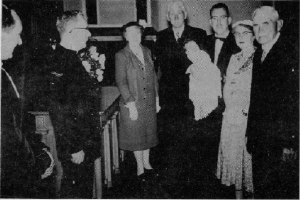 |
| The first time Elders
accompanied parents at the font for Baptism. From left: Rev.
J.H. Rankin, Rev. Tommy and Mrs. Watson, John Scott, Elder;
Wendell & Mrs. Watson with baby Shannon, William Irvine,
Elder. |
�Top
CHAPTER 6
CHOIR
The first mention of choir was in "The Witness" on August 2nd 1895,
when after the renovations, the choir space, which I have previously
mentioned, was described in that paper. But in the first half of the
1800's there was a precentor - Thomas Gracey. He is mentioned in
connection with the Communion services and was paid 7s. 7d. for the extra
work involved at that time.
There was no choir at that time, he, alone led the singing. There is no
evidence to show when Thomas Gracey left the scene, but the next precentor
mentioned was John Andrews of Clintagh. He was paid �8 yearly and resigned
in 1911, but whether there was a choir or not is not clear.
Money was apparently very scare, for in March 1908 Mr. Andrews wrote to
the Committee to say he had not received any salary for 1907 and that 3s.
3d. was owing from 1906. To meet this bill the committee arranged a
special service. Rev. Gregg, Dromara preached at it on 18th June 1908.
They had three hundred tickets printed and sold at six-pence each as well
as special collectors. In future it was decided to collect from house to
house for the precentor, at a time when no other collections, as stipend,
sustentation or pew-rents were made.
From 1911 until 1920 there seems to have been no precentor, maybe they
couldn't get anyone. I am told Mr. R.W. Beatty, who had been in Anahilt,
but had some dispute there, helped out at times, but he eventually went
back to Anahilt.
In 1920 Mr. W.E. Hawthorne, Cargycroy, was appointed at a salary of �15
yearly, and certainly by that time there was a choir. According to records
he was asked to come along one night weekly and train any young people
interested in music. W.E. Hawthorne was a character, but a born musician.
He used a tuning fork, which gave the note middle C and from that he could
transpose it into whatever key the tune was set in.
Usually he sang bass, and sometimes tenor, of if the sopranos were weak he
joined them. One little weakness he had was arriving late, leaving the
choir struggling on their own. On these occasions as soon as he came into
the aisle he started singing, and sang right down to the front. But he was
excused these lapses as he had his own problems, being a widower with four
young children.
I remember one Sunday Mr. Moorhead had announced the Psalm and verses to
be sung. The choir got to their feet but Mr. Hawthorne corrected Mr.
Moorhead about the singing. I can still see Mr. Moorhead looking down at
him over his glasses, and saying in his forthright way "Get on with your
work." There was nothing for Mr. Hawthorne to do but get his tuning fork
going.
As a token of gratitude Mr. Hawthorne received a cheque for �22 at a
social on 18th January 1929. This had been specially collected from the
congregation.
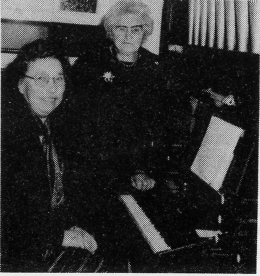 |
| Mrs. I. Scott with Miss M. Irvine,
who has been a choir member for seventy-two years. |
|
As previously mentioned hymns were first introduced in 1938 under Rev.
Creelman's leadership. In 1942 the first organ was installed, after much
deliberation and discussion and after a congregational vote by a majority
of seven.
It was a pedal organ and it was dedicated on a beautiful mid-summer's day
- 21st June 1942, amid a great feeling of excitement. The choir sang two
anthems, "How amiable are thy Dwellings" and "As pants the Hart" to packed
houses. Mr. Robert Moorhead played for the opening Sunday. Miss Nora
Moorhead was the first organist for five years until her marriage in 1947
at a salary of �26 yearly.
She was succeeded by Mr. W. H. Adams, Lisburn at �40 yearly. It was in Mr.
Adams' time that the present pipe organ was installed in 1951. It came
from Mulavilly Church of Ireland, and our little organ went to
Ballynahinch Congregational Church. Mr. Adams left in 1955 and our present
organist Mrs. Isabel Scott began work, thirty-three years ago.
On 13th December 1981 the new choir room was opened, a wild snowy evening.
To help with funds the choir beforehand held Sales in Lisburn Markets,
started the collection of waste paper and held concerts. Our first effort
was a -party on New Year's night 1979. Everyone in the congregation got a
printed invitation, but unfortunately the weather was unfavourable, roads
were blocked with snow and temperatures were very sub-zero around minus
15. Fifty people turned up; we had an enjoyable night despite the snow and
so began the Choir Room Fund.
The clock in the Choir Room was given by Jean Stewart (nee Scott) a
previous choir member in memory of her parents. A plaque was donated in
memory of Jim Eddie by his family. Jim had been a member of the choir
since he was a lad of twelve until his final illness. Mr. & Mrs. Fred
Clarke presented the blue curtains at the organ and choir seats at the
same time.
�Top
Another person worthy of note is Minnie Irvine. She was a member for over
seventy years from the age of twelve until lately, surely that must be a
record.
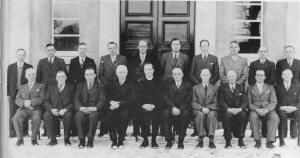 |
Committee & Session, January
1952.
Back Row: T. Gourley, J. McKibbin, D. Kirk, R. Irvine, D.
Campbell, O. Green, W.J. Rainey, J. Murdock, R. Bell, Wallace
Beatty.
Front Row: S. Rutherford, H.
Scott, J. Eddie, J. Scott, Rev. J.H. Rankin, W. Irvine, S.
Bell, J. McDonald, W. Rutherford, F. Magowan. |
|
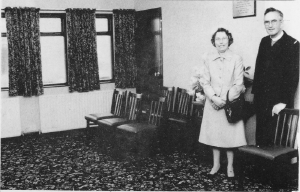 |
Mr.McConaghy & Mrs. Scott in the new Choir Room, 1981 |
|
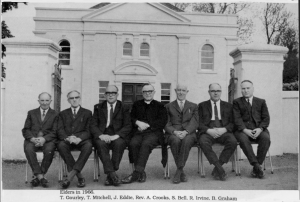 |
|
Elders in 1966
T. Gourley, T. Mitchell, J. Eddie, Rev. A. Crooks, S. Bell, R.
Irvine. B. Graham |
|
�Top
The following lovely poem has a flavour of romance about it with choir
connections.
The Old Elm Tree.
In Loughaghery Churchyard,
Where many memories lie,
There grows erect, majestic
A stately elm tree.
Its arms widespread extended,
Sweet cumbrous in the blast,
And lie in lazy dullness
When boreas has passed.Its graceful towering dome top
An airy lightness bears,
The golden tints of autumn
Its fading foliage wears,
Its trunk, its bole, its heavy limbs
Are massive as can be,
You couldn't find a grander
Than our old elm tree.
One evening in the gloaming
At night the choir met,
For fun, as well as singing
Sweet times we'll ne'er forget.
In sauntering slowly down the green,
I happened for to see
A maiden fair trip lightly
And hide behind the tree.
I thought she might be coaxing
But then it might be fun,
What tempted her, on seeing me,
Behind the tree to run.
|
Or else she thought to shun me
And wanted to be free
broke through all my shyness
And crept behind the tree.The tree became a trysting place
We met as lovers do,
We often sat beneath its shade
Our friendship to renew;
Sly cupid smote us sorely
That maiden fair and me
Then waved her wand and pointed
To the Church beside the tree.
Those long gone days are vivid
Their memory's ever green
The days of youthful innocence
When love's first blush is seen,
The winter snows are on us now,
And happy still are we
We bless the night when first we met
Beneath the elm tree.
And when this little flicker's gone
That shades so dim a light,
When life's frail curtain is withdrawn
That hides the day from night.
They'll lay us gently in the dust,
Fulfilling God's decree
To sleep the sleep of blessed hope
Beside the old elm tree.
(Author unknown) |
�Top |